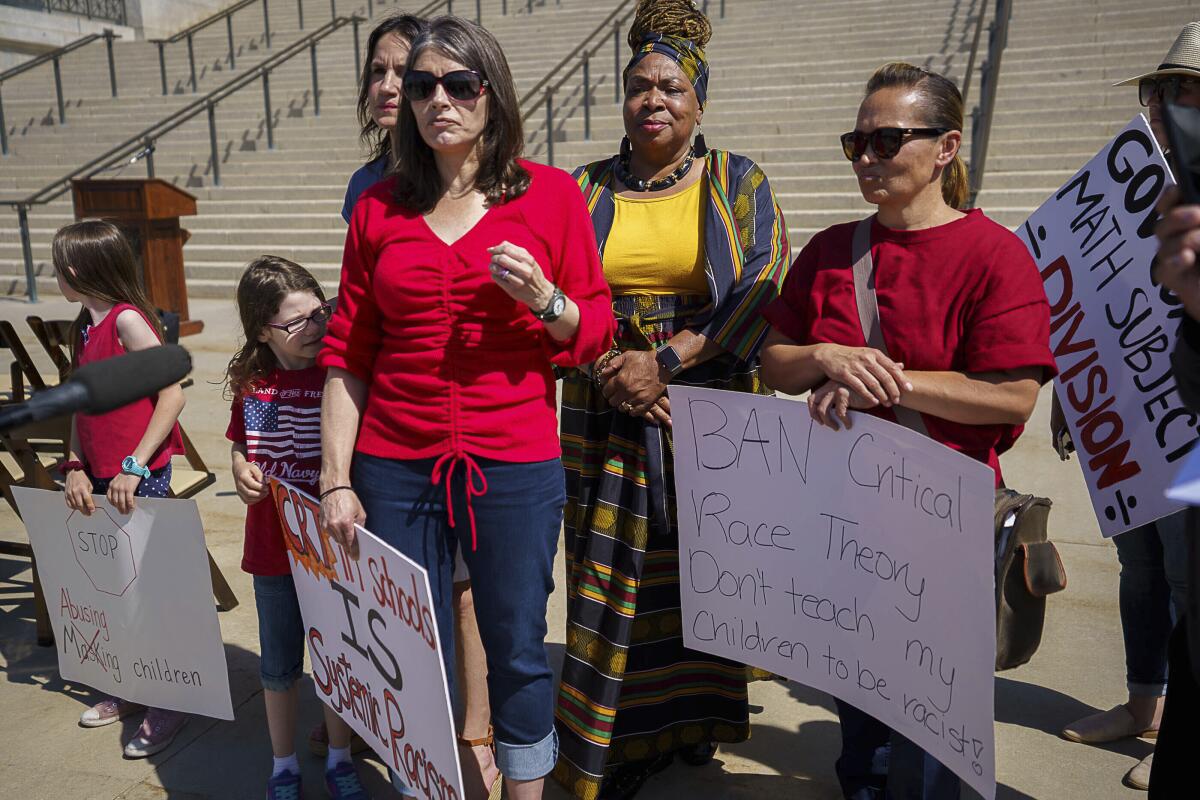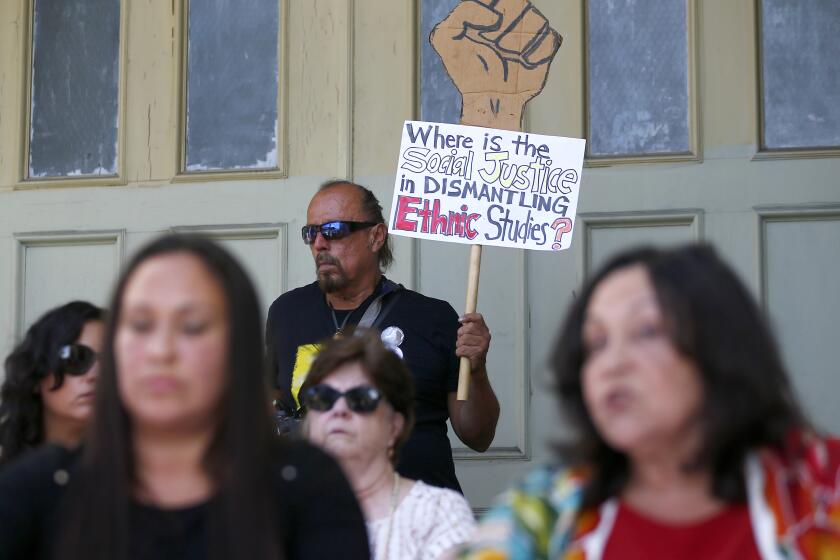Column: How to stop worrying that CRT will corrupt your kids

- Share via
In 1925, John W. Butler, a legislator in Tennessee, told reporters that years earlier he’d “read in the papers that boys and girls were coming home from school and telling their fathers and mothers that the Bible was all nonsense.”
“I didn’t think that was right,” Butler told the New York Times in July of that year.
At first Butler couldn’t figure out exactly what students had seen in school that allegedly led them to reject Christianity. But with help from a preacher, he settled on a culprit: A biology class about heritable characteristics. Evolution.
Butler then authored the Butler Act, which banned the teaching of Darwin’s theory and became the basis for the famous Scopes monkey trial.
A century later, another theory is being banned in schools: critical race theory, or CRT. Several state legislatures have passed bills to keep it out of classrooms, alleging that it challenges the popular belief that racism in America mostly ended with the civil rights movement. Some add anecdotal evidence that critical race theory guilt trips white students and leaves Black students with apathy and despair.
It corrupts the youth, in other words. Just like evolution in 1925. Or Socratic inquiry in 399 BCE.
Critical race theory is an odd object of hostility for lawmakers. Just as evolution is an effort to understand how organisms become more complex with time, CRT tries to understand why civil rights legislation in the United States didn’t end segregation.
Perhaps, the theory proposes, the law itself — or the real-estate business, or policing, or even tropes in the language — is inflected by racism in ways that are hard to detect.
To take one simple and rather shopworn example of CRT in action: What if the adjective “articulate,” a go-to word of praise for individual Black people in public life, conceals an assumption that Black expression is, ordinarily, incoherent?
Sometimes “articulate” is just “articulate.” But it’s interesting to ask deeper questions. How might questioning our assumptions about that word illuminate ordinary experience? How might this analysis contribute to making the U.S. more just?
Opponents of critical race theory dismiss inquiry like this, but what’s weird is how much it worries them. CRT, like evolution in 1925, strikes them as more than just too complicated. It somehow threatens to deprive their kids of faith — not faith in the Christian God this time, but in the decency of the United States and in white Americans of good character.
There are some impressive leaps of logic here. A kid in this hypothesis goes from considering the reflexive use of “articulate” in certain circumstances to despair and demoralization.
Critical race theory is little understood, and it does not have to be divisive. But the uproar over ethnic studies in public schools is clouding the realities.
I was exposed to CRT in graduate school (here’s where I admit I did a PhD in English) and I find it hard to imagine how this tragedy goes down. CRT sharpened my analytical eye for the way seemingly neutral elements of experience can express something less than neutral, and how a position of “no ideology” can itself reflect an ideology. I’m not sure CRT made me a better or worse person; in fact, I doubt it touched my moral fiber.
Opponents of CRT often admit, as did Butler with evolution, that they know little about it. They don’t even seem to reject it as a theory. Instead, they imagine that, as one vocal opponent put it, this theory “judges my daughter by the color of her skin” and “encourages and instructs her to prejudge others by theirs.”
I don’t buy this. But as a parent I get that subjecting one’s child to judgment of any kind feels risky. And what if some of that judgment is directed at you? What parent has not known the fear of being rejected by a child in favor of newly discovered values, new beliefs, a new modus vivendi?
Immigrant parents rue the loss of their kids to American language and culture. Religious parents mourn the children who leave the family’s beliefs behind . A right-wing child can be a source of acute heartbreak to liberals. (An article in Der Spiegel some years ago was titled “Shock Your Parents: Become a Neo-Nazi.”) Many parents treat even experiments in style — say, the adoption of a hijab or Burning Man garb — as existential rejection.
In the battle over curriculum, the immediate goal for schools and teachers is to oppose any unconstitutional bans on ideas, while not dismissing as immoral anyone who objects to critical race theory. Parents are much more likely to appreciate the value of an intellectual challenge if schools acknowledge the primal parental fear that what gets taught may separate kids from their innocence, their faith, their optimism — and their families.
Instead of banning “The 1619 Project” or critical race theory from middle-school social studies classes, let’s demand that principals and teachers address the unease some parents experience when their offspring are taught anything that contradicts what they themselves believe. At the same time, school administrators need to make it clear that classes in the humanities challenge students to examine existing beliefs. That doesn’t make schoolteachers “corrupters.”
Teaching in the tradition of Socrates means unsettling students with hard questions. But an intellectual provocation like critical race theory is not a trauma. It’s education.
More to Read
A cure for the common opinion
Get thought-provoking perspectives with our weekly newsletter.
You may occasionally receive promotional content from the Los Angeles Times.











